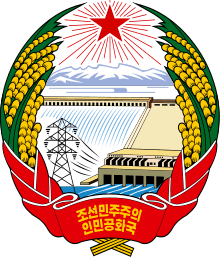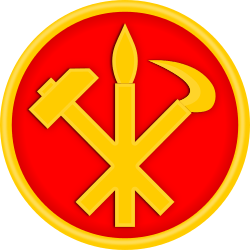National meetings of the Workers' Party of Korea
 |
|---|
| This article is part of a series on the politics and government of North Korea |
|
|
|
Related topics |
The following is a list of national meetings of the Workers' Party of Korea. This article defines national meetings as party congresses (Korean: 조선로동당 당대회) and conferences of representatives. The party congress is nominally the highest body of the Workers' Party of Korea (WPK) according to its charter.[1] The charter states specifically that it should convene at least every fifth year, however, the congress has never managed to be convened in that time frame.[2] There was a gap of 36 years between the 6th Congress and the 7th Congress. However, two party conferences were convened in the period 2010–2012.[2]
The Congress hears the reports of central authorities, makes amendments to the party's charter, sets the party's political line,[3] elects the Chairman of the Workers' Party of Korea, elects the Central Committee and elects the Central Auditing Commission. The 1st Plenary Session of the elected Central Committee then elects the Politburo, the Executive Policy Bureau, the Central Military Commission and other bodies of the Central Committee.[2] Despite this, as Fyodor Tertitskiy notes, "When it comes to the supreme leader of North Korea, it is not his position that makes him a leader, it is the person who makes a position one of leadership. Kim Jong-un may be called supreme commander, first chairman or even God-Emperor – it does not matter, he is in charge by right of bloodline."[2] His election as Chairman, and other posts, at the 7th Party Congress (or elections to offices at other meetings) does not mean the meeting was empowered to make decisions independent of the leader.[2]
Keys
| Abbreviations | |
|---|---|
| CC | Central Committee of the Workers' Party of Korea |
| FM | Full member (a member with voting rights). |
| AM | Alternate member (a member without voting rights). |
| Political Report | Political Report to the Central Committee, a document which briefs delegates about the period since the last congress and future work. |
| Charter | Charter of the Workers' Party of Korea, the rules and regulations which governs the WPK. |
| PMR | Party members represented at the congress by delegates (the party membership at the time). |
| ND | Not disclosed by the WPK. |
Meetings
Congresses
| Congress | Duration (start—end) |
Delegates | CC elected |
Political Report (presented by) |
Charter (amendments) |
PMR |
|---|---|---|---|---|---|---|
| 1st Congress 3 days 1946 election |
28 August – 30 August 1946 |
801 | 43 | Kim Il-sung | Adopted | 336,399 |
| 2nd Congress 4 days 1947–1948 election |
27 March – 30 March 1948 |
999 | 63 | Kim Il-sung | Amendment | 750,000 |
| 3rd Congress 7 days 1955–1956 election |
23 April – 29 April 1956 |
916 | 71 FM – 43 AM |
Kim Il-sung | Amendment | 1,164,945 |
| 4th Congress 8 days 1960–1961 election |
11 September – 18 September 1961 |
1,657 VD – 93 NVD |
85 FM – 50 AM |
Kim Il-sung | Amendment | 1,311,563 |
| 5th Congress 12 days 1969–1970 election |
2 November – 13 November 1970 |
1,734 | 117 FM – 55 AM |
Kim Il-sung | Amendment | 1,600,000 |
| 6th Congress 5 days 1979–1980 election |
10 October – 14 October 1980 |
3,062 VD – 137 NVD |
145 FM – 103 AM |
Kim Il-sung | Amendment | ND |
| 7th Congress 4 days 2016 election |
6 May – 9 May 2016 |
3,467 VD – 200 NVD |
129 FM – 106 AM |
Kim Jong-un | Amendment | ND |
Conferences
| Conference | Duration (start—end) |
CC elected |
Charter (amendments) |
Decisions |
|---|---|---|---|---|
| 1st Conference 4 days 1958 election |
3 March – 6 March 1958 |
— | — | 1) "On First Five-year People’s Economic Development Plan" 2) "On Further Strengthening Party Unity and Cohesion" 3) On "organizational issues" |
| 2nd Conference 4 days 1966 election |
3 October – 6 October 1966 |
— | — | 1) "Current Situation and Our Party's Tasks" 2) "On Imminent Tasks of Socialist Economic Construction" 3) "On the Vietnam Issue" |
| 3rd Conference 1 day 2010 election[4] |
28 September 2010 | 124 FM – 105 AM |
Amendment | 1) "Decision To Unchangingly Elect High Great Leader Comrade Kim Jong Il as the WPK General Secretary" 2) "Decision on Revising the WPK Charter" 3) "Election of members to the central leadership organs of the WPK" |
| 4th Conference 1 day 2012 election |
11 April 2012 | — | Amendment | ND |
References
Specific
- ↑ Savada, Andrea Matles, ed. (1993). "North Korea – The Korean Workers' Party (KWP)". North Korea: A Country Study. Library of Congress Country Studies. Retrieved 9 May 2016.
- 1 2 3 4 5 Tertitskiy, Fyodor (2 May 2016). "What happens at a North Korean Party Conference or Congress". NK News. Retrieved 3 May 2016.
- ↑ Kim 1982, p. 126.
- ↑ Frank, Ruediger (5 October 2010). "Hu Jintao, Deng Xiaoping or Another Mao Zedong? Power Restructuring in North Korea". 38 North. U.S.-Korea Institute, Johns Hopkins University School of Advanced International Studies. Retrieved 22 April 2018.
Bibliography
Articles and journals:
- Kim, Nam-Sik (Spring–Summer 1982). "North Korea's Power Structure and Foreign Relations: an Analysis of the Sixth Congress of the KWP*". The Journal of East Asian Affairs. Institute for National Security Strategy. 2 (1): 125–151.
General
Information on congresses & conferences, number of delegates, number of people elected to CCs, party membership, the individual who presented the Political Report and information on when the congress was convened can be found in these sources:
- Beck, Peter (2011). "North Korea in 2010: Provocations and Succession". Asian Survey. University of California Press. 51 (1): 33–40. doi:10.1525/as.2011.51.1.33. JSTOR 10.1525/as.2011.51.1.33.
- Ilpyong, Kim (Spring 1962). "North Korea's Fourth Party Congress". Pacific Affairs. University of British Columbia. 35 (1): 37–52. JSTOR 2752710.
- Suh, Dae-sook (1988). Kim Il Sung: The North Korean Leader (1st ed.). Columbia University Press. pp. 75–80 (1st Congress), 83–91 (2nd Congress), 145–148 (3rd Congress) & 169–173 (4th Congress). ISBN 0231065736.
- Rüdiger, Frank (20 May 2016). "The 7th Party Congress in North Korea: A Return to a New Normal". 38 North. Retrieved 9 January 2017.
- "North Korea -- Propaganda Coverage of Party Representatives Conferences" (PDF). Open Source Centre. 10 April 2012. Retrieved 13 October 2017.
